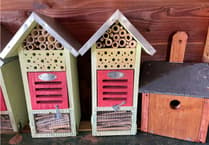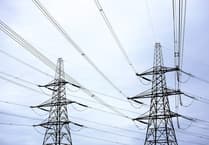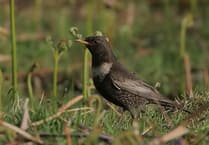“If we carry on the way we are going we will lose the Usk in ten years,” says Tiggy Pettifer starkly.
“It will become a watery desert and there will be no life left in it at all. The effects will be felt by everyone living and working in the Usk valley and beyond. ” she added.
Coming in the wake of a report by Natural Resources Wales (NRW) , which found that the River Usk had the highest incidence of phosphate pollution in all of the Welsh rivers, there is little to suggest her words are scaremongering.
Fertiliser run-off from agriculture, human and animal waste and industrial effluent have been linked as causes of high phosphate levels in rivers and Tiggy fears that unless serious action is taken now it will be too late, especially for the precious stock of salmon, which have traditionally made their home in the Usk.
“They say that salmon are the canaries of the sea and that if all is well with the salmon, then all is well elsewhere. Well I can tell you that all is not well with the salmon in the Usk,” said Tiggy, who not only teaches fly fishing at her Glanusk home, but also works as a fundraiser for the Atlantic Salmon Trust.
“In the 1980s there were thousands of salmon caught in the Usk; last year it was down to being hundreds, which just shows how the stocks are being depleted thanks to pollution.”
“Salmon are a keystone species as so many other residents of the river, like insects, otters and even plants, depend on them not only to survive but to thrive,” she said.
“If we save the salmon, we’re not just saving one species, we’re saving the whole river,” she stressed.
Listening to Tiggy speak, it’s easy to see why so many people stop and take heed of her warnings, and yet even her passion is seemingly unable to bring home the stark warnings to those in power with the ability to prevent this devastation of our natural resources.

“We are now almost past the point of conservation and I want the Welsh Government, the NRA and Mark Drakeford to sit up and take notice because if we’re not careful one of the premier rivers in Wales will be lost on their watch,” she says.
“We are being let down by organisations like Natural Resources Wales and local governments who are not doing enough to protect rivers and stop this form of pollution.
“When rules and environmental laws have been broken these crimes have not been prosecuted and there has been a distinct lack of fines or any other form of punishment for those found wanting. Water companies continue dumping raw sewage in rivers unchallenged and not enough action is taken to hold them to account. We need to keep up the pressure on them and others to make ensure they take responsibility and rectify both their mistakes and amend their working practices to ensure it does not happen again in the future.
“We all need cold, clean water and it’s particularly essential for salmon. Our rivers are getting hotter by the day and the phosphate and nitrates which are seeping into them create algae blooms which take the oxygen out of the water - and if you take the oxygen out of the water you kill everything else,” said Tiggy.
“I’ve watched salmon stocks in the Rhiangoll - a tributary of the Usk - and we used to have 200 pairs between Glanusk and Pengenfordd. Now there are none.
“We have to remember that these salmon are genetically unique - salmon from this tributary of the Usk have different DNA from those from the next tributary so once we lose them they really are gone. Every tributary, every valley is its own unique ecosystem and we have to fight for them all. ”
“The time has come for us all to work together, from farmers, to environmental agencies and even those people who come to use the river for recreation,” she said.
“We can all help by acting as a community to hold those in power to account and make those in authority take responsibility for the health of our rivers.
“There are lots of seemingly small things we can all do as individuals which can make a difference on a day to day basis as well.
“We can all stop putting wipes and sanitary products down the loo. If you have a septic tank make sure it’s not leaking and causing run off to enter the river and we can start thinking about what we have in our sinks, because everything that goes down the drain ends up in our waterways.
“We can also report pollution when we see it entering the river and support the Usk and Wye Foundation and maybe even become volunteers to help in a practical way
“We can make our voices heard by writing to our MPs and MSs and local authorities, calling on them to hold those in power to account and to pay due dilligence to planning applications which could add to the already critical situation on the Usk.
“ We all have a lot to answer for. I wish I’d known 30 years ago what I know now but if we all pull together we can make a difference even at this late stage to save this river and its ecosystem not just for us but for future generations. I want my grandchildren to be able to stand on the banks of the River Usk, in the same way I did with my mother and to see a healthy environment teeming with life and fish swimming in cold, clean waters,” said an emotional Tiggy.
Show your support for the Usk in Crick
Tiggy Pettifer has joined forces with well-known river campaigner Angela Jones to stage a march in Crickhowell this weekend.
Angela has hosted a number of protest marches in towns including Abergavenny, Usk and Monmouth to raise awareness of pollution within our rivers, and also hosts regular monthly ‘Save the River Usk’ meetings,
Starting in the Beaufort Street car park at 10am on Saturday, October 1, the demonstration will make its way through the town to the Usk Bridge.
“We’d like as many people as possible to join us, so make some banners and bring them along so we can make some noise and get people to realise that the Usk is in real danger,” said Tiggy.




